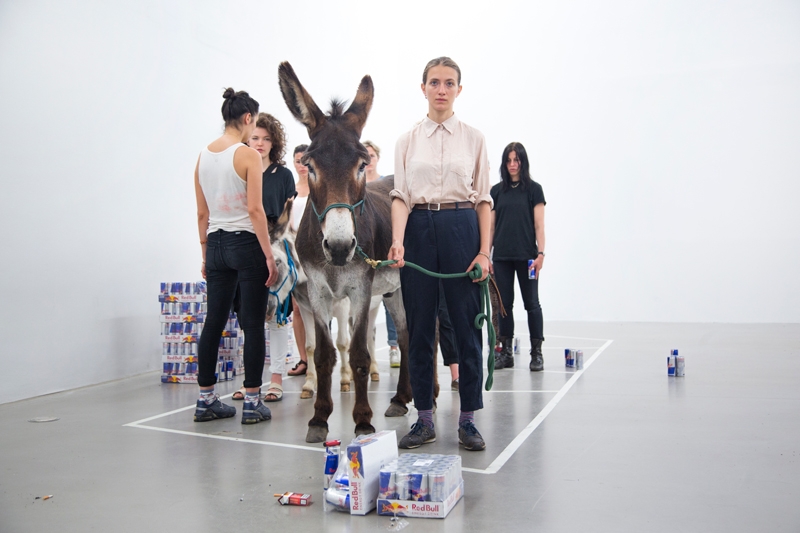Information moves socially. Power transfers via group dynamics. Relationships play out according to the rejection of, or acquiescence to, agreed social codes. At this moment I don’t want to hear anything more about social networks or to be made any more aware of their presence. On the other hand, paying attention to the particular ‘feel’ of relationship dynamics, to the visceral, bodily impact of one person’s behaviour on another or to power and energy being physically passed from hand to hand does seem appealing. Urgent, even.
Anne Imhof’s ensemble performances take their cues from the coded behaviours and clandestine languages of cliques and clubs used by doormen and pickpockets, transposing personal and group endeavours into precise (and often achingly slow) movements. In the various iterations of Imhof’s work School of the Seven Bells, for example, small metal rods are passed with learned grace between the hands of the performers, who are gathered either in a circle or in a row. As the rods knock against one another and the rings on the performers’ fingers (another combination of lines and circles), they create a clinking soundtrack, and the choreographed gazes between individuals add tension to the proceedings as they change groupings. Named after a mythological underground academy for thieves, the work is a quasi translation of Robert Bresson’s Pickpocket (1959), particularly those scenes in which we see a series of stolen items passed subtly between individuals after the initial lift, so that the location of the stolen object is lost and the responsibility for the crime diffused. Unlike the virtuosic lightness of Bresson’s pickpockets, however, Imhof’s actors convey a kind of seething aggression.
The artist’s performances are often soundtracked by a combination of recorded noise and music, together with incidental sounds and spoken word. For Aqua Leo (2013–), named after code words used by doormen at the Offenbach am Main nightclub Robert Johnson, the sound of energy drinks being opened and cigarettes being lit punctuates the performance, as donkeys and human performers move between spaces that confer the status of being ‘in’ or ‘out’. In terms of spoken scripts the German artist (who also plays with a band, Beautiful Balance) employs ars nova, a choral style developed in the Middle Ages, to layer multiple phrases, creating a schizophrenic form of meaning. At the time of writing, DEAL (2015), Imhof’s latest commission, is just about to open at MoMA PS1 in New York. It features interactions between performers seemingly compelled by a set of rules to dunk their hands in vats of buttermilk and to manage the release and containment of giant bunny rabbits. At a time when labour is screened away, information is held offsite and it is difficult to lay blame for events such as the global banking crisis at any individual door, Imhof stages visible forms of relational transaction, desire and dependency that nonetheless build to no climax.
Anne Imhof lives between Paris and Frankfurt, the latter being where she studied at the Städelschule, graduating in 2012. She follows her MoMA PS1 commission, DEAL (2015), with a solo show in New York at Reena Spaulings Fine Art and participation in group shows at Palais de Tokyo, Paris, and the Nouveau Festival at the Pompidou Centre, Paris. Selected by Laura McLean-Ferris, contributing editor, ArtReview.
Read all of our 2015 FutureGreats profiles
This article was first published in the March 2015 issue.
